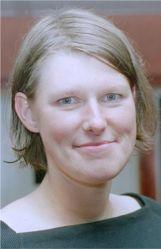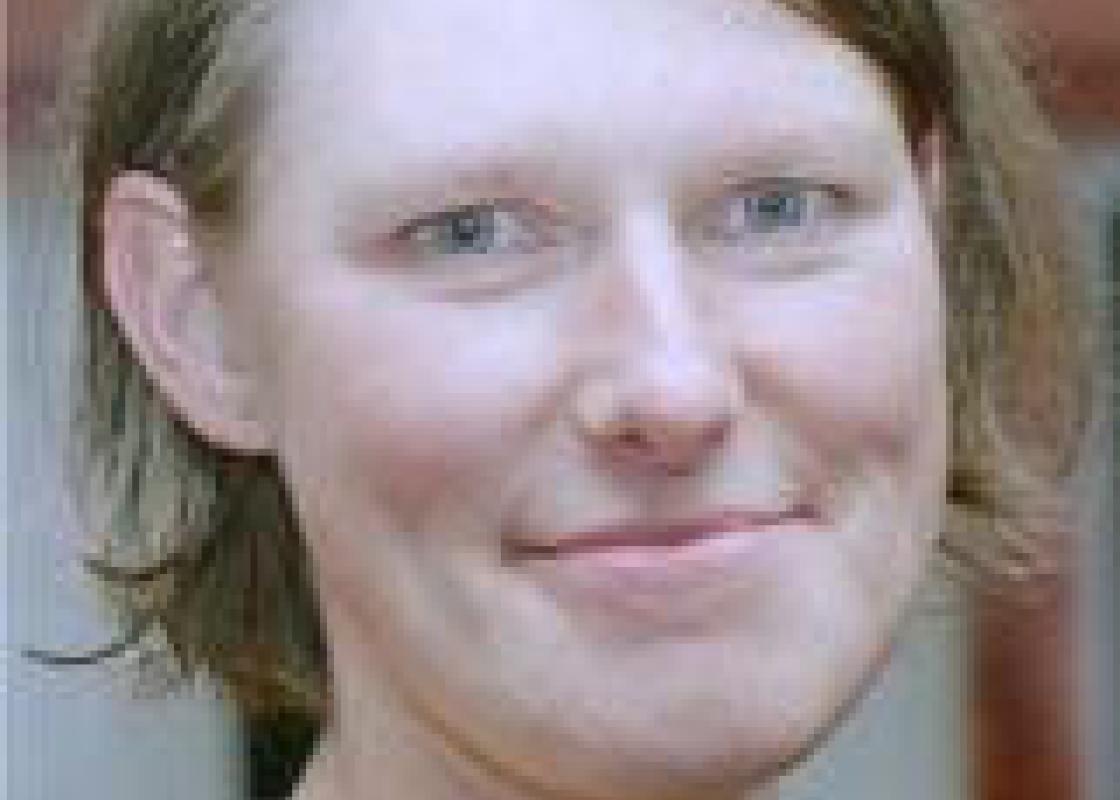
Kristin S. Scharffscher's master thesis has the title "A Time for Gender? Protection against rape in refugee camps." With this work she introduced feministic theory and a gender perspective to the study of resilience, where it was not present earlier.
- I decided to find a vulnerable group in the most insecure situation I could think of; women in flight from an armed conflict in Africa, says Scharffscher.
Now she is busy setting up a doctorate project so that these studies can be continued.
Guidelines that are not followed up in practice
The master thesis was written following field work in the Jembe camp, one of Norwegian Refugee Council's (NRC) refugee camps in Sierra Leone on the west coast of Africa. The camp was established early in 2001. Scharffscher interviewed leaders, relief workers and female refugees in the camp. She also spoke to NRC leaders localised in Sierra Leone's capital city, Freetown and in Oslo. And she visited other camps in Sierra Leone. She found that there did not exist any well-thought-out plan for how to best avoid gender-based violence. Although Jembe camp appeared well-driven and relatively safe, it seemed more a matter of luck, coincidence and individual relief workers' efforts - than of plans and routines. This is in spite of the fact that UN's High Commissary for Refugees (UNHCR) in 1991 presented guidelines on how female refugees can be protected against sexualised violence.
- Few of the people I talked to had heard about these guidelines. More than ten years after their being issued, they are still ignored when refugee camps are being set up, Scharffscher underlines.
Half the country's population in flight
A large part of the world's 40 million refugees are women and children. 13.5 million of them are refugees within their own country. In March 2002 almost 7000 women and men lived in Jembe, many of them refugees in their own country. Almost half of the population in this country was driven to flee as a result of a brutal civil war where the recruitment of child soldiers was part of the agenda. And where rape was used to manifest power by the rebels, the government forces and by the United Nations Protection Force.
- Today's generation of young women, who have grown up in Sierra Leone during the civil war have been especially prone to extreme forms of male power. In one rebel-controlled area girls under 18 years of age are referred to as 'the lost generation', since they have been the object of systematic physical attacks and sexual slavery, Scharffscher says. It is not safe in the refugee camps either.
Rape - an invisible problem
Life in a refugee camp is unstable with reduce social control, which makes women vulnerable. A report about sexual abuse of children in Liberia, Guinea and Sierra Leone published by the British Save the Children and UN's High Commissary for Refugees, claims that even relief workers in refugee camps use their authority and power to take advantage of female refugees. The report describes how sexual services are demanded as payment for food, medicine and other services, Scharffscher says.
Inquiries done afterwards never confirmed these allegations, but they did reveal that sexual oppression of female refugees is widespread.
- When I arrived to the Jembe camp, an attempt to rape two young girls had just happened. There were witnesses to the misdeed and other proof. Later I found out that the assailant had been arrested by the police, but that they had let him go. Several people told me that it was difficult to get assaulters convicted. Something which does not exactly encourage women to press charges, she explains, and adds:
- Sexual assaults become invisible because they are hushed up. To be raped is considered shameful. Then you are unclean and should be hidden. In addition there is the fear of HIV and AIDS which also contribute to women not telling what they have been exposed to.
Unclear who has the responsibility
UNHCR's guidelines were intended to increase consciousness and give the problem visibility. But they are not used in practice. To blame each relief worker for this, is as wrong, according to Scharffscher, as saying that huge oil catastrophes are caused by human error. She thinks that it is a matter of system failure in organisations.
- I found that the guidelines were not sufficiently communicated from the High Commissioner to the volunteer organisations and to the relief workers in refugee camps. Gender-based violence is offered little attention both in the written material and at meetings. In this area confusion of responsibility and lack of interest and priority prevails. There are few or no routines for training, communication and feedback. The relief workers locally waited for instructions from their leaders, while the leaders waited for instructions from the UNHCR or from those financing the relief work back home. It was unclear who really had responsibility for gender matters and the related safety, she points out.
Little training - no reporting
Scharffscher thinks that the training of relief workers is a critical point. There is a great deal of turn-over in the organisation, new employees from different countries arriving constantly and often no overlapping. The Jembe camp had newly gotten a new British female leader when Kristin S. Scharffscher arrived.
- Many of the women in the camp reported that the new leader did a lot for them, and that she listened to them. My impression was that this was due to her personal initiative, not due to the training she had received, Scharffscher says.
- Another female leader I spoke to thought that gender consciousness among the local relief workers was often lacking completely - since almost all of them were men. Many men refused to admit that sexual violence occurred since they had guards who patrolled regularly and since nothing was reported. This woman's opinion was that the men ignored the problem and lacked knowledge.
Water and latrines
Increasing security for women involves, among other things, making sure that the refugee camps are not built in a way that makes assault easy. The UNHCR guidelines ask the relief organisations to pay special attention to where latrines, water supplies and the distribution post for medicine and food are localised. In addition long term measures such as the education of women, information campaigns aimed at changing men's attitudes and women's quotas in local committees where decisions are made are important.
- The availability of clean water and firewood is very important for women's safety, Scharffscher underlines. - Getting water and firewood is women's work, and if they have to walk far to find this - maybe even spend the night outside on their way home - they become vulnerable for assault.
In the Jembe camp water and firewood was readily available. - But this was more a matter of coincidence than the following of UNHCR guidelines on the behalf of camp management. Problems drilling for water made them take water from the nearby river, filtering and cleaning it, and bringing it into the camp so that the women could fetch water there, Scharffscher explains.
Localising the latrines near the camp and making sure that the area was well-lit at night are also important steps to take.
- Gender-based violence and rape are the result of the misuse of power and a rigid gender role pattern, but that rape happens can also be understood as system failure in an organisation, Scharffscher thinks. An organisation with plans and routines which aim to prevent gender-based violence can at least reduce the risk, and to a large degree, increase security.
Clarifying responsibility
An international seminar held in 2002 identified four reasons why the UNHCR guidelines were not implemented well enough: lack of resources, a reduction in the number of people working in the field, the lack of female employees and female refugees not participating in decision-making.
- My opinion is that this is not first and foremost a mater of resources, Kristin S. Scharffscher says.
- It is rather a matter of changing the priorities, and that small yet effective changes should be made in the operative focus and in the organisations' routines. Scharffscher thinks that there should be a clear placement of responsibilities combined with great flexibility in the organisation of the refugee camps.
- The ones closest to a problem should be responsible for solving it. At the same time the people leading the daily work for UNHCR and the relief organisations should be responsible for integrating matters involving gender-based violence into plans, reporting systems and follow-up routines. The leaders must assume responsibility, not just delegate it to specialists on gender questions who are only there every now and then. Rape is not a women's problem, it is a problem for the entire society, Kristin S. Scharffscher concludes.
The master programme on resilience management from the University College of Stavanger graduated their first group of students in June 2001. The college has recently achieved the right to award doctorate degrees in resilience management, and are planning to appoint a professional group to work on the subject of resilience management and complex relief operations. Kristin S. Scharffscher took her master degree in resilience management in 2002 and is now working as project coordinator at the Centre for International Health at the Faculty of Medicine at the University of Tromsø. From before she had education and experience as a journalist.
